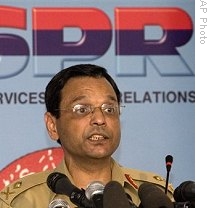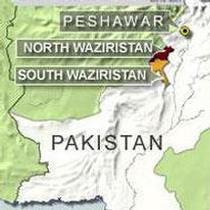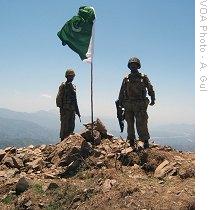Islamabad
23 September 2009
Pakistan army says that its ongoing operations have severely dented the Taliban-led insurgency in the country's northwest. Military officials say the campaign is being gradually extended to what they consider the rebel stronghold - the border region of Waziristan. Senior army officials believe the advances against militants and close anti-terror coordination have helped improve the level of trust between Pakistan and the United States.
 |
| Pakistan's military spokesman Maj. Gen. Athar Abbas briefs the media about the recently launched military operation, in Rawalpindi, Pakistan (File) |
Pakistan is under international pressure to launch a long-awaited ground offensive in the South Waziristan tribal region, that borders Afghanistan. American military commanders believe top al-Qaida leaders are hiding there and are using the territory for attacks on international troops on the Afghan side of the border.
The mountainous territory is considered a training ground for militants, under the leadership of Tehrik-e-Taliban Pakistan, which is an alliance of more than a dozen al-Qaida-linked groups. Fighters of the militant outfit are also believed to be involved in cross-border attacks in Afghanistan. However, the setbacks in Swat and the killing of the embattled groups' chief commander, Baitullah Mehsud, are believed to have dealt a major blows to the Taliban militants in Pakistan.
Army spokesman Major-General Athar Abbas tells VOA the military is now concentrating on the South Waziristan tribal region, calling it "the center of gravity of terrorist forces" in the country. But General Abbas warns that the Mehsud terrorist network is still intact and a heightened ground offensive could annoy tribesman and provoke a widespread uprising.
 |
General Abbas says there is a complete understanding between the Pakistani military and the NATO military commanders on how to deal with the militants in the Waziristan region.
It is widely believed, in and outside Pakistan, that the country's prime intelligence agency created most of the militant groups, for the government's purposes. Until the Swat operation was launched, the common perception was that army establishment was reluctant to go after the militants because of the past ties with these outfits. But spokesman General Abbas says the skepticism is misplaced and ignores the major human losses Pakistani military has suffered since joining the U.S-led anti-terror war, eight years ago.
"How can somebody imagine that a military who has lost over 1,800 officers and men in these operations in these areas, fighting against these militants, would allow services intelligence organization to hobnob with certain assets or certain terrorist groups whom the military is fighting against and the army chief would allow this services intelligence to take these kind of initiatives," added Abbas. "It does not make sense. The military is fighting. There are constraints. There are problems and we are going against our people in our area. Many of them have been misguided. So, when you apply excessive force in your own area against your own people, there are constraints and over reliance or over use of force sometime bounces back [backfires]."
The general says that, until recently, the Pakistani military was being held responsible for the cross-border attacks in Afghanistan and the military's capabilities were being questioned. But he says those doubts resulted from a lack of understanding of Pakistan's constraints in operating in the tribal areas.
"So, now with more exchanges at various levels, with more talks and more sharing of information, I think the understanding has improved a lot," said Abbas. "So, therefore, I would say that successful military operation has created an environment of better trust, better understanding."
 |
| Pakistani soldiers under their flag in Swat valley |
"This is a very rugged terrain. It is a mountainous area, very treacherous. We require air mobility," he added. "We do require targeting through air like attack helicopters, which is very effective in mountainous terrain. We do require surveillance equipment, the night vision capabilities. All this would enhance the technical and the resource material capability of the military and that would allow us to be more efficient, more effective and that would save our own lives."
In their recent talks with American leaders, Pakistani officials have repeatedly urged Washington to give Islamabad the drone technology that the United States has used to take out several top al-Qaida and Taliban leaders in the country's tribal areas.